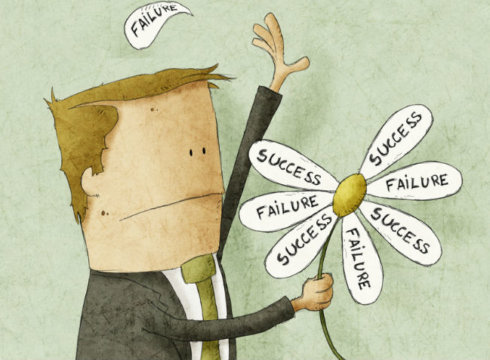Inc42 Daily Brief
Stay Ahead With Daily News & Analysis on India’s Tech & Startup Economy
Failure should be our teacher, not our undertaker. Failure is delay, not defeat. It is a temporary detour, not a dead end. Failure is something we can avoid only by saying nothing, doing nothing, and being nothing. – Denis Waitley
I’m guessing this isn’t the first time you’ve seen a quote like this.
Slowly but surely, our society — particularly in the tech startup world — has begun to realize that failure is a key ingredient in success. After all, very few businesses or professionals succeed with their first idea or their first job. Failure yields learning. Learning breeds innovation. And innovation drives success.
But I also have the feeling that the concept of “fail fast” still hasn’t sunk in for most people — especially CEOs who are afraid that one big mistake (or a collection of small ones) will lead to their business (and their career) careening off the side of a metaphorical cliff.
Here’s my response to that: “If you are not failing, you are not succeeding.”
There’s no doubt about it: The feeling of failure sucks. No one likes to be “in the red,” or to perform poorly. But the fact of the matter is that if you aren’t failing, you are not learning valuable business lessons. The path to figuring out what does work requires you to figure out what doesn’t work first. To reiterate my point above: Very, very few people nail it first time around.
Putting Failure in Context
Now, before you start to think that my firm is the Chicago Cubs of the venture capital world, let me put my appreciation of failure into context.
We embrace failure when it happens as the result of trying something worthwhile. In other words, if we feel like the things we’re doing align with our goals, capabilities, and aspirations, and that they have the potential to make a massive impact (either for our firm or our portfolio), then failure is an acceptable outcome.
The reason is simple: The acts of experimenting, strategizing, executing, and hypothesizing are impactful, even if they lead to a dead end.
The bottom line is that whether the things we thought would make an impact go down in flames or uncover a groundbreaking new idea that propels us forward, both scenarios ultimately teach us something that make us better going forward.
Unfortunately, too many businesses don’t see it that way. They prefer predictability and perfection and status quo. I’ve got bad news for those businesses: Predictability will do nothing to help you grow into a great, big business, and perfection doesn’t exist.
Iterative Failure is Better than Slow Success
A few years ago, Jonathan Fields published an excellent post on his blog that said businesses are better off building bad stuff quickly than building the same, average stuff slowly. In fact, Fields phrased his opinion a bit more bluntly:
There’s no greater accelerant along the path to genius than a flaming trail of crap.
The key here is to make sure that everything you do revolves around the tenants of your aspirations — the long-term and most aggressive goals for your company, sometimes called your mission, vision, and values. That way (provided those activities and initiatives are geared toward making a massive impact), whether you succeed or fail is somewhat irrelevant.
To do this, you ultimately need to focus all of your efforts and energy on:
- Goal orientation (rather than activity or time orientation)
- Exceeding expectations against tough goals
- Creating optimal pressure, which leads to feelings of challenge and pride of achievement
- Checking and discovering flaws in approach and results
- Encouraging detail orientation, transparency, and high quality standards
- Discipline to spend time on activities that drive results
The reality of creating, building, and scaling a business is that most situations (and all new situations) are unpredictable, so the best approach is to get to a quick implementation, identify the issues and opportunities, and then iterate again.
If you follow this iterative approach a few times, you will eventually become comfortable with failure and I’m willing to bet that you’ll more quickly discover the issues or roadblocks that are keeping you from building a great, big business, or preventing you from becoming the best you can be.
I call this success, but you might also call it failing multiple times.
Note: We at Inc42 take our ethics very seriously. More information about it can be found here.


